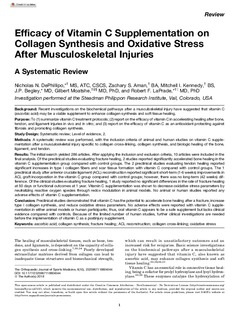Efficacy of vitamin C supplementation on collagen synthesis and oxidative stress after musculoskeletal injuries: A systematic review
DePhillipo, Nicholas; Aman, Zachary S.; Kennedy, Mitchell I.; Begley, J.P.; Moatshe, Gilbert; LaPrade, Robert F.
Journal article, Peer reviewed
Published version
Permanent lenke
http://hdl.handle.net/11250/2595660Utgivelsesdato
2018Metadata
Vis full innførselSamlinger
- Artikler / Articles [2096]
- Publikasjoner fra Cristin [1084]
Originalversjon
The Orthopaedic Journal of Sports Medicine. 2018, 6, 2325967118804544. 10.1177/2325967118804544Sammendrag
Background: Recent investigations on the biochemical pathways after a musculoskeletal injury have suggested that vitamin C (ascorbic acid) may be a viable supplement to enhance collagen synthesis and soft tissue healing. Purpose: To (1) summarize vitamin C treatment protocols; (2) report on the efficacy of vitamin C in accelerating healing after bone, tendon, and ligament injuries in vivo and in vitro; and (3) report on the efficacy of vitamin C as an antioxidant protecting against fibrosis and promoting collagen synthesis. Study Design: Systematic review; Level of evidence, 2. Methods: A systematic review was performed, with the inclusion criteria of animal and human studies on vitamin C supplementation after a musculoskeletal injury specific to collagen cross-linking, collagen synthesis, and biologic healing of the bone, ligament, and tendon. Results: The initial search yielded 286 articles. After applying the inclusion and exclusion criteria, 10 articles were included in the final analysis. Of the preclinical studies evaluating fracture healing, 2 studies reported significantly accelerated bone healing in the vitamin C supplementation group compared with control groups. The 2 preclinical studies evaluating tendon healing reported significant increases in type I collagen fibers and scar tissue formation with vitamin C compared with control groups. The 1 preclinical study after anterior cruciate ligament (ACL) reconstruction reported significant short-term (1-6 weeks) improvements in ACL graft incorporation in the vitamin C group compared with control groups; however, there was no long-term (42 weeks) difference. Of the clinical studies evaluating fracture healing, 1 study reported no significant differences in the rate of fracture healing at 50 days or functional outcomes at 1 year. Vitamin C supplementation was shown to decrease oxidative stress parameters by neutralizing reactive oxygen species through redox modulation in animal models. No animal or human studies reported any adverse effects of vitamin C supplementation. Conclusion: Preclinical studies demonstrated that vitamin C has the potential to accelerate bone healing after a fracture, increase type I collagen synthesis, and reduce oxidative stress parameters. No adverse effects were reported with vitamin C supplementation in either animal models or human participants; thus, oral v
Beskrivelse
This article is distributed under the terms of the Creative Commons Attribution-NonCommercial-NoDerivs 4.0 License (http://www.creativecommons.org/licenses/by-nc-nd/4.0/) which permits non-commercial use, reproduction and distribution of the work as published without adaptation or alteration, without further permission provided the original work is attributed as specified on the SAGE and Open Access pages (https://us.sagepub.com/en-us/nam/open-access-at-sage).
